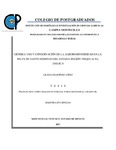Género, uso y conservación de la agrobiodiversidad en la milpa de Santo Domingo del Estado, región triqui alta, Oaxaca.
Abstract
La milpa desempeña un papel importante en el enriquecimiento y conservación de la agrobiodiversidad, y favorece la producción de alimentos para las unidades domésticas indígenas. Diversos estudios con perspectiva de género han analizado la función de éstas en la conservación de los recursos naturales, sin embargo, en pocos estudios se ha analizado la participación diferencial por género en las actividades productivas y en la conservación de los recursos genéticos; conocimientos tradicionales y el control de los recursos dentro de la milpa. Los objetivos de esta investigación fueron 1) conocer la participación de mujeres y hombres en las actividades productivas de la milpa y en la conservación de los recursos genéticos; maíz, frijol y chilacayote; 2) describir los conocimientos tradicionales y los usos diferenciados por género de los productos que se obtienen en la milpa; 3); contrastar la valoración de los conocimientos de mujeres y hombres; 4) explicar cómo influyen las relaciones de género en el ejercicio de los derechos y el control de los recursos en la milpa. La investigación se realizó en Santo Domingo del Estado, región triqui alta, Oaxaca. Se utilizó una metodología mixta con énfasis en la cualitativa. Las técnicas de recolección de datos cualitativos fueron: observación participante, entrevistas semiestructuradas a informantes clave y a integrantes de las unidades domésticas, recorridos de campo y talleres participativos. Con la metodología cuantitativa, se realizaron colectas de maíz y frijol, y con las muestras obtenidas se efectuaron análisis de laboratorio para determinar la calidad de los granos. Los resultados muestran que las mujeres participan principalmente en la cosecha y postcosecha, poseen conocimientos tradicionales desde el proceso productivo hasta la preparación de alimentos. Ellas no ejercen plenos derechos sobre la tenencia de la tierra ni sobre los recursos obtenidos de la milpa. Los hombres participan en todas las actividades productivas, poseen conocimientos tradicionales referentes al proceso productivo y ejercen plenos derechos sobre la tenencia de la tierra. _______________ GENDER, USE AND PRESERVATION OF AGROBIODIVERSITY IN THE MAIZE CROPLANDS OF SANTO DOMINGO DEL ESTADO, HIGH TRIQUI REGION, OAXACA. ABSTRACT: Maize croplands play an important role in the enrichment and preservation of agrobiodiversity and favor the production of food for indigenous house units. Several studies from the gender approach have analyzed their function in the preservation of natural resources; however, few of these have analyzed gender differentiated participation in the productive activities and the preservation of genetic resources, traditional knowledge, and control of the resources within the croplands. The objectives of this research were: 1) to learn the participation of women and men in the productive activities of the cropland and in the preservation of genetic resources; maize, bean, and fig-leaf gourd (Cucurbita ficifolia); 2) to describe the traditional knowledge and gender differentiated uses of the products obtained from the cropland; 3) to contrast the valuation of knowledge held by women and men; and 4) to explain how gender relationships influence the exercise of rights and control upon the cropland. The research was carried out in Santo Domingo del Estado, high triqui region, Oaxaca. A mixed methodology was used, with emphasis on the qualitative aspect. The qualitative data collection techniques were: participating observation, semi-structures interviews with key informants and members of the house units, field observations, and participating workshops. Using the quantitative methodology, maize and bean samples were taken, and laboratory analyses were done on the samples obtained to determine the grain quality. The results show that women participate mainly in the harvest and postharvest; they have traditional knowledge from the productive process all the way to food preparation. They do not have full rights on land ownership or on the resources obtained from the cropland. The men participate in all the productive activities; they have traditional knowledge referring to the productive process, and have full rights on land ownership.
Collections
- Tesis MC, MT, MP y DC [317]


